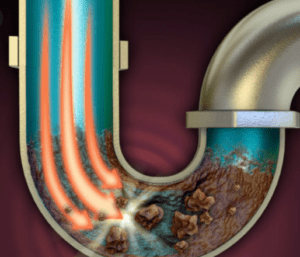Is your drain blocked and you are not sure what exactly is causing it? Are you stuck deciding between attempting a DIY unblock or employing a professional drainage engineer? Well, you have come to the right place. In this article, we will give you all the information you need on blocked drains, from how to identify one to the best methods of dealing with the problem, so that you can make an informed decision for your needs. more information will also be provided on why prevention is key to avoiding blocked drains in the future.
What Causes Blocked Drains?
For starters, it’s important to understand what causes blocked drains. If left unattended, these blockages can cause floods, sewage spills and other unpleasant messes in your home. Common items that contribute to blocked toilets, sinks, and shower drains include: food waste, items that don’t belong down the drain, oil and grease, hair and soap residue and foreign objects such as toys.
As these problems can grow worse over time, it is important to identify them quickly and act accordingly. Fortunately, there are plenty of telltale signs of a blocked drain that you can look out for:
- Slow draining water
- Unusual gurgling or bubbling noises coming from the pipes
- Bad odours coming from the drains
- Sewage backup into the home
DIY or Professional?
Once you’ve identified that your drain is actually blocked, the next step is to decide whether to attempt a DIY solution or call a professional plumber. There are pros and cons to both approaches.
To begin with, attempting a DIY solution can often save you money if the issue is relatively minor. You can typically find basic unblocking equipment at hardware stores or online, such as manual plungers or chemical unblocking agents. However, it is important to remember that if the problem is more complex than you anticipated, then DIY solutions may cause further damage.
On the other hand, hiring a professional can cost more, however they have the expertise and experience that allows them to efficiently detect and resolve more serious blockages. Subsequently, they can also advise you on preventative measures you can take to avoid blocked drains in the long-term.
Best Practices for Unblocking Drains
If you do opt for a DIY solution, here are some tips on how to go about unblocking a drain:
- First, you should ensure to wear protective gear such as gloves and safety glasses, as well as open windows to mask the unpleasant odours.
- The first port of call should always be the plunger. Place it over the drain and depress the handle repeatedly, forcing air pressure into the pipe.
- Chemical unblocking solutions are another option. Make sure to read the labels carefully, as certain products are only suitable for certain types of pipes.
- If it is a sink or toilet blockage, you can use a plumbing snake. This is a flexible metal tool that can be inserted into the pipe and used to push the blockage until it is dislodged.
It is worth noting that if these steps fail, your blockage could be too far down the line or caused by something too big to be shifted manually. In this case, it would be worth calling a professional.

Preventing Future Blocked Drains
In addition to trying to clear the blockage yourself, there are ways to prevent similar issues arising in the future. Here are some tips:
- Make sure not to pour oils and fats down the drain. These can solidify further on down the line and cause clogs.
- Do not flush paper towels, feminine hygiene products, or cotton swabs down the toilet, as these can get caught up in the pipes.
- Be mindful of what you put down the kitchen sink, and make sure not to leave any food scraps in the sink or wash them down the drain.
- Finally, regularly cleaning your drain traps can help keep them smelling fresh and ensure that debris isn’t building up.
By following these steps, you can reduce the likelihood of blocked drains in the future and maintain a healthy plumbing system.
Conclusion
Ultimately, blocked drains are a common problem but luckily, there are steps you can take to try and fix the issue yourself, or alternatively employ a professional who can diagnose and resolve the issue quickly and reliably. Finally, preventing blocked drains in the future is just as important, so follow the tips outlined above to keep your plumbing running smoothly!
